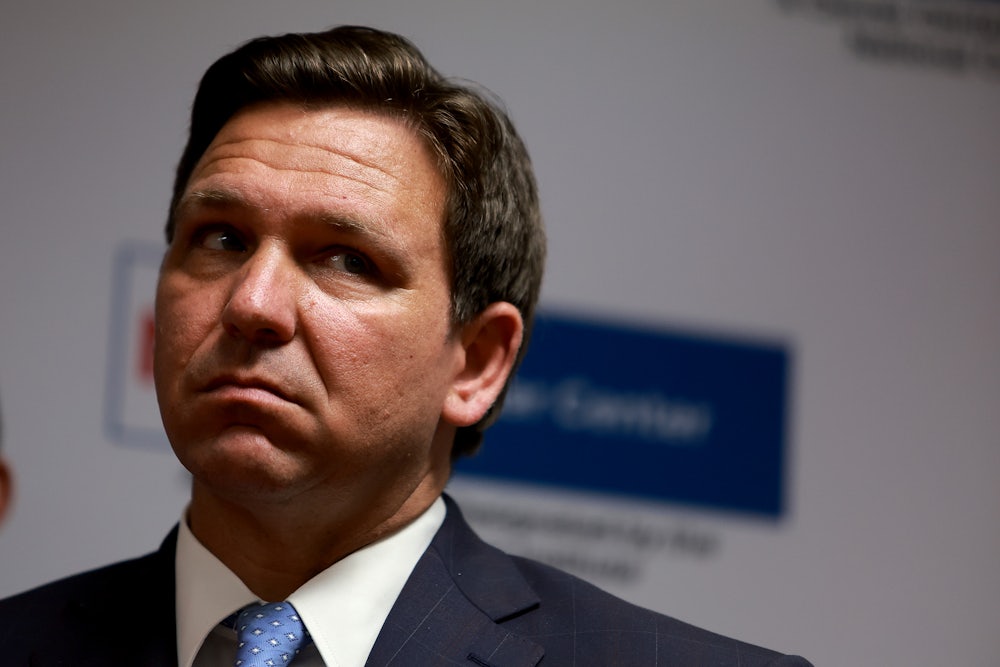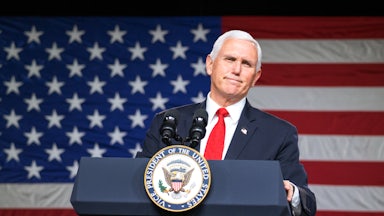Seven years ago, during the last competitive Republican primary, nearly every candidate not named Donald Trump followed the same basic strategy: do not attack Donald Trump. This was a foolish strategy: Generally speaking, it is a good idea to try to convince people that the person who is leading the pack is unworthy of front-runner status because you need to persuade those voters to switch allegiance. But in fairness, the presidential aspirants who ended up as 2016’s sacrificial lambs were at least in uncharted territory. There had not been a candidate quite like Donald Trump—racist, combustible, obviously unqualified—in a presidential primary before. Unlike many election cycles, it wasn’t necessarily foolish to assume that Trump would implode, or his voters would wake up, or both. And so the rest of the field let him be—staying out of the blast zone and waiting for the inevitable act of self-destruction. The candidate best positioned to carry Trump’s mantle would simply sweep up his voters and coast to victory.
Well, fool us once: We now know definitively that this is not a good strategy for running against Donald Trump. This is actually something that became abundantly clear while the 2016 field was trying to execute this plan. Trump’s main surviving rivals, Marco Rubio and Ted Cruz, eventually started slinging mud midway into the primary calendar, which was far too late for it to matter. Still, there was a lesson here. If you want to beat Donald Trump in a presidential primary, you should actually try to beat him, instead of waiting for him to beat himself. It is still early days in the 2024 Republican presidential primary. But seven years after this critical lesson was learned, Trump’s latest group of presidential primary rivals are out there making the same mistake: No one wants to actually make the case that Trump should not be president.
On Tuesday, The New York Times reported that Trump’s former Vice President Mike Pence—who Trump’s supporters literally tried to kill on January 6, 2021—had decided on his plan to win the primary. Pence, the Times relayed, would emulate the last Republican standard-bearer: Ronald Reagan. “If Mr. Trump represents the populist New Right, Mr. Pence is preparing to run for president in the mold of Ronald Reagan,” wrote not one but three Times reporters. “His team’s improbable bet is that a ‘Reagan coalition’ composed of the Christian right, fiscal conservatives, and national security hawks—can be reassembled within a party transformed by Mr. Trump.”
To do this, Pence would adopt hardline positions on abortion—currently a big loser nationally, though one Pence is betting will help him with evangelicals, and “[push] back against Republican efforts to police big business on ideological grounds,” currently the cause du jour amongst much of the right. It is a throwback strategy and not one that seems to be rooted in the realities of the right-wing politics of the moment—or politics in general, for that matter. There is little here, moreover, that gives you the sense that Pence has a plan for directly dealing with Trump head-on, or for convincing voters that the current Republican front-runner—by a substantial measure—is not qualified to lead the nation again. Reading between the lines, it’s clear that Pence’s emphasis on Reagan cosplay should be viewed as a plan to float above the fray. Against Trump, this doesn’t work.
But Pence is hardly alone. After Trump’s deranged CNN town hall last week, Never Back Down—a super PAC associated with juiceless Florida Governor Ron DeSantis—saw an opening and hit the former president on a host of issues:
On CNN tonight, Trump spent an hour talking about:
— Never Back Down (@NvrBackDown24) May 11, 2023
- What he did or didn't do on January 6, 2021
- Whether he will pardon people who harmed police officers
- How the 2020 election was rigged
- Whether he supports terminating parts of the U.S. Constitution or the whole thing…
This is not particularly combustible stuff. “What he did or didn’t do on January 6, 2021” is at best so vague as to be completely meaningless. At worst, it dodges around the central contradiction at the heart of all campaigns against Trump: the unwillingness of his competitors to plainly state that he lost in 2020 and doesn’t deserve another shot. Still, DeSantis’s surrogates at least try to get in some licks and hit at Trump’s vulnerabilities, from his wish to “terminate” the Constitution, to the fact that he was recently found guilty in a defamation case related to alleged sexual abuse. It’s not a great start, in other words, but it’s a start.
Alas, the Never Back Down PAC then … backed down: “Don’t expect to hear it again,” reported the news start-up Semafor of the organization’s willingness to throw some spicy barbs in Trump’s direction. “The tweet generated some heated internal pushback at Never Back Down, while multiple prominent conservative commentators piled on publicly.”
“That post was a massive mistake,” one DeSantis ally told Semafor. “It sounded like it came from CNN, and I think people inside realized that that was a massive mistake, and I hope it won’t be repeated again.”
Charitably speaking, it can be hard to properly calibrate an effective attack on Trump. He has held onto power within the GOP for so long—in part because rivals within the party have struggled to hit on an anti-Trump message that resonates with Republican voters in a manner sufficient to break the hold the former president has over a broad swath of the GOP base. But to perfect those attacks requires practice. It requires, to use one of the most irritating words in the political lexicon, an emphasis on disciplined messaging.
One way to hit Trump would be to argue that his presidency was simply not that effective at advancing his alleged goals—that Trump’s penchant for shooting his mouth off (and shooting himself in the foot) damaged the right’s ability to actually move on its domestic policy goals in particular. But no candidate wants to admit that Trump’s time in office was a failure. Instead, they’re seeking some sort of proverbial Goldilocks zone in which they can draw a contrast with him without actually saying anything nasty about the man.
This is especially beguiling because one of the lessons from the 2016 primary was that voters liked nastiness. Or at least they liked Trump’s nastiness—Marco Rubio’s ill-fated foray into Trumpian dick-joke wit blew up in the Florida senator’s face. Still, at least Rubio understood that he was in a fight. He showed somewhat more mettle than Pence’s attempt to dodge the conflict or the DeSantis team’s humiliating walk-back of their anti-Trump fusillade. With primary season hurtling toward us, it remains to be seen whether any Republican candidate has any interest in playing to win or, for that matter, in running a normal primary campaign in which you attack your rivals, particularly the one that’s leading the pack. This isn’t particularly complicated stuff. But so far, it seems beyond the grasp of a presidential field that seems determined to be less relevant than those who Trump handily defeated eight years ago.










